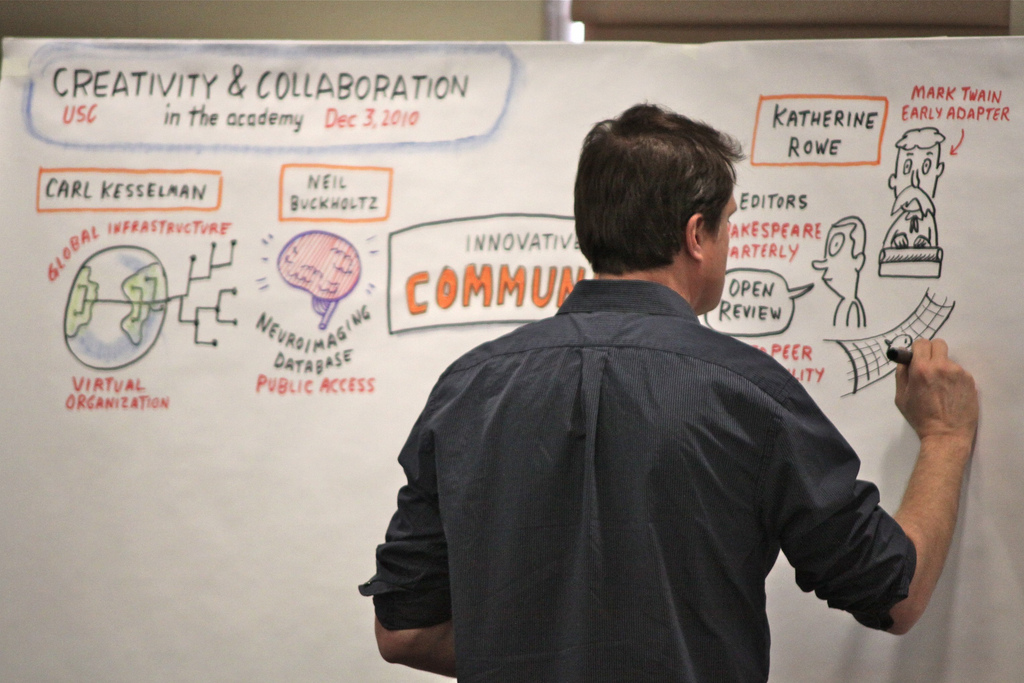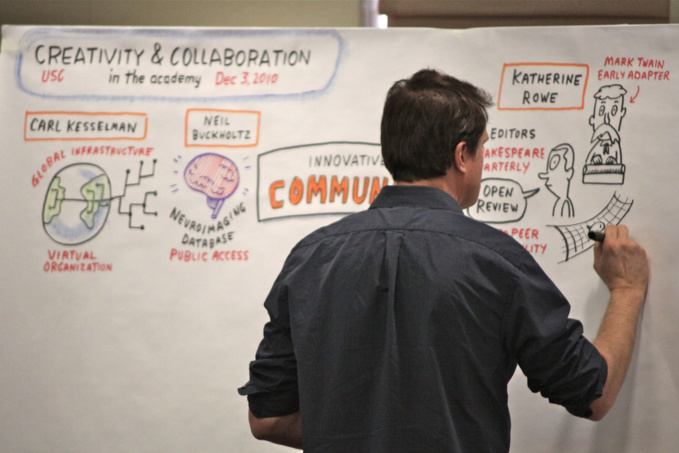Marty Neumeier wrote a book about exploring one’s creative self. Here are ten tips that will help you ignite the imagination.
Rule 1. Improve your study skills
In the 21st century, illiterate are not those who cannot read and write, but those who are unable to learn, finish their studies and re-train. The ability to manage the learning process boosts personal growth. When you become your own teacher, you can learn anything and build new skills over existing ones.
Rule 2. Invest in your originality
Originality is more than a prudent imitation. This is an ability to dream and move away from logic. Like other skills that once were considered innate, this feature can be developed as well. Depending on the level of your knowledge and imagination, originality falls into one of four categories: 1) ideas taken from the same area 2) ideas borrowed from another area 3) ideas new to you 4) ideas new to the world. As the experience and creativity grow, you will explore new levels of originality with each new idea you discover.
Rule 3. Take a quick look at your idols’ style
Do not be afraid to be influenced to discover your own style. Carefully follow people, groups and cultures you admire. Of course, it’s very important to differentiate between imitation and growing your own talent based on fundamental principles. Try to borrow framework of their work, not the work itself. Copying has little to teach.
Rule 4. Choose your niche
Find a direction to invest your whole soul in it. Devote yourself to activities that suit your interests. If you are not yet good at something, but still inspired, then you get a huge advantage. Ordinary work then becomes exceptional, and the narrowest niche turns into a whole world of possibilities.
Rule 5. Practice
Creativity always contains an element of mastery, a set of practical skills that combine aesthetic judgment and creative tools. A musician needs to turn the instrument into a continuation of his mind and body. A woodworker should "feel" his equipment and materials, and a CEO must understand various kinds of reports, scorecards and control mechanisms. You can certainly generate original ideas without practical skills. However, you will face difficulties in their implementation, that is, when you want to demonstrate, develop, test them and just share them. Therefore, nothing is going to work out without practice. Take small steps and study everything that meets on your way.
Rule 6. Make mistakes
Welcome mistakes instead of fearing them. They should be regarded as clues when it comes to creativity. Each of them partially opens the veil of the true mastery’s secrecy.
Rule 7. Strive to receive constructive criticism
Creativity involves imagination and intuition – and, often, logical mistakes. The best remedy for logical blindness is feedback from people who are able to constructively criticize your ideas and give instructions for further action. Even a not-quite-relevant response is an instruction, if you treat it objectively. Remember, anything that does not kill your idea makes it stronger.
Rule 8. Nurture your enthusiasm
Creativity is not about time management, but your enthusiasm and "passion-management". Passion is a deep excitement that you experience because of your business, project, profession etc. This is the engine of creative geniuses. The key to passion is to regard it as a resource, like a savings account or a garden. If you want to maintain the balance in your bank account, you need to refill it. If you want to have a garden, you need to take care of the plants. If you seek to nurture your passion, you will have to invest in projects, training and inspiration. These investments can be expressed in reading, attending seminars, master classes, internships, participating in charitable projects and other activities that bring pleasure.
Rule 9. Stay focused
Leonardo da Vinci possessed an ideal ability to focus. He was very active and sociable person: he dressed in the latest fashion, made friends with royalty, attended and organized brilliant social receptions himself - and could disappear from the field of view for several weeks to reflect without interference. Thanks to this discipline, he created a huge number of works of art and inventions, and left an enormous collection of diaries, with about seven thousand pages of handwritten text survived. You cannot completely disconnect from the world, but you can block it temporarily while you are working. Independent work will do you good.
Rule 10: Violate the rules
The rules of creativity are not a rigid scheme, but common models that artists and scientists have been following for many centuries. Acquaintance with them will broaden your horizons and will cope with any task that requires maximum concentration.
Based on 'The 46 Rules of Genius: An Innovator's Guide to Creativity' by Marty Neumeier
Rule 1. Improve your study skills
In the 21st century, illiterate are not those who cannot read and write, but those who are unable to learn, finish their studies and re-train. The ability to manage the learning process boosts personal growth. When you become your own teacher, you can learn anything and build new skills over existing ones.
Rule 2. Invest in your originality
Originality is more than a prudent imitation. This is an ability to dream and move away from logic. Like other skills that once were considered innate, this feature can be developed as well. Depending on the level of your knowledge and imagination, originality falls into one of four categories: 1) ideas taken from the same area 2) ideas borrowed from another area 3) ideas new to you 4) ideas new to the world. As the experience and creativity grow, you will explore new levels of originality with each new idea you discover.
Rule 3. Take a quick look at your idols’ style
Do not be afraid to be influenced to discover your own style. Carefully follow people, groups and cultures you admire. Of course, it’s very important to differentiate between imitation and growing your own talent based on fundamental principles. Try to borrow framework of their work, not the work itself. Copying has little to teach.
Rule 4. Choose your niche
Find a direction to invest your whole soul in it. Devote yourself to activities that suit your interests. If you are not yet good at something, but still inspired, then you get a huge advantage. Ordinary work then becomes exceptional, and the narrowest niche turns into a whole world of possibilities.
Rule 5. Practice
Creativity always contains an element of mastery, a set of practical skills that combine aesthetic judgment and creative tools. A musician needs to turn the instrument into a continuation of his mind and body. A woodworker should "feel" his equipment and materials, and a CEO must understand various kinds of reports, scorecards and control mechanisms. You can certainly generate original ideas without practical skills. However, you will face difficulties in their implementation, that is, when you want to demonstrate, develop, test them and just share them. Therefore, nothing is going to work out without practice. Take small steps and study everything that meets on your way.
Rule 6. Make mistakes
Welcome mistakes instead of fearing them. They should be regarded as clues when it comes to creativity. Each of them partially opens the veil of the true mastery’s secrecy.
Rule 7. Strive to receive constructive criticism
Creativity involves imagination and intuition – and, often, logical mistakes. The best remedy for logical blindness is feedback from people who are able to constructively criticize your ideas and give instructions for further action. Even a not-quite-relevant response is an instruction, if you treat it objectively. Remember, anything that does not kill your idea makes it stronger.
Rule 8. Nurture your enthusiasm
Creativity is not about time management, but your enthusiasm and "passion-management". Passion is a deep excitement that you experience because of your business, project, profession etc. This is the engine of creative geniuses. The key to passion is to regard it as a resource, like a savings account or a garden. If you want to maintain the balance in your bank account, you need to refill it. If you want to have a garden, you need to take care of the plants. If you seek to nurture your passion, you will have to invest in projects, training and inspiration. These investments can be expressed in reading, attending seminars, master classes, internships, participating in charitable projects and other activities that bring pleasure.
Rule 9. Stay focused
Leonardo da Vinci possessed an ideal ability to focus. He was very active and sociable person: he dressed in the latest fashion, made friends with royalty, attended and organized brilliant social receptions himself - and could disappear from the field of view for several weeks to reflect without interference. Thanks to this discipline, he created a huge number of works of art and inventions, and left an enormous collection of diaries, with about seven thousand pages of handwritten text survived. You cannot completely disconnect from the world, but you can block it temporarily while you are working. Independent work will do you good.
Rule 10: Violate the rules
The rules of creativity are not a rigid scheme, but common models that artists and scientists have been following for many centuries. Acquaintance with them will broaden your horizons and will cope with any task that requires maximum concentration.
Based on 'The 46 Rules of Genius: An Innovator's Guide to Creativity' by Marty Neumeier



















